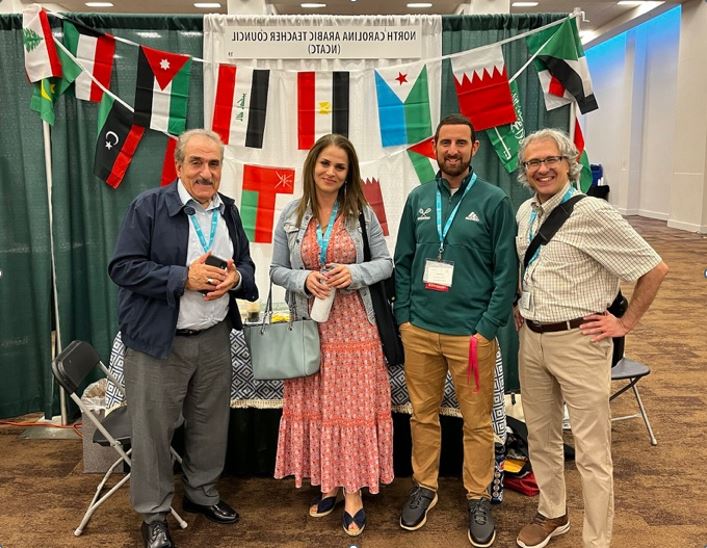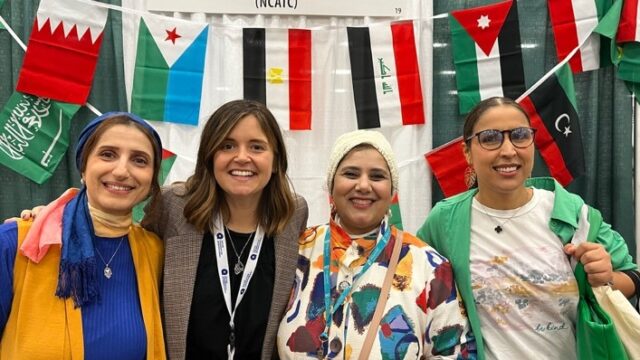This year has been one of continued growth and integration for Arabic language across the state of North Carolina. We witnessed the successful launch of a new public, high-school language program at the North Carolina School of Science and Math – Morganton – under the teachership of Fayez El-Kurdi in the 2023-24 school year. And we’re welcoming in another new public, high-school program to New Hanover County Schools this Fall for the 2024-25 school year thanks to the dedication and passion from their resident French teacher, Fatima Sail. Bringing us to a total of seven High School Arabic language programs in North Carolina!
Also, for the first time, NCATC members gathered at the FLANC – Foreign Languages Across North Carolina – as an officially registered allied language organization. 500 language teachers ✅ 18 languages ✅ 8 Arabic presenters ✅ 3 years and counting for the NC Arabic Teacher Council ✅. Arabic teachers had the opportunity to share from their classrooms and curricula while learning from others in addition to building connections to schools and administrators for further advocacy of Arabic language education in North Carolina. Be on the lookout for another 8 Arabic presentations at the upcoming FLANC conference, October 5-6th this year in Winston-Salem, North Carolina.
If you’re curious to learn more about Arabic language activities across the state, tune in to these episodes of All Things Arabic, a podcast hosted by Caroline Sibley, NCATC Coordinator. She followed UNC-Duke Arabic debate teams to the national championships (we won’t spoil who won), interviewed Rana Nasser, the longest standing Arabic teacher in the state at Cumberland International Early College about their Arabic honors society and debate team and spoke with Dr. Ann Marie Gunter, world languages consultant for the North Carolina Department of Public Instruction, about what Arabic can learn from other languages in North Carolina.

Last year, we welcomed in a new board to guide and support NCATC activities for the next two years. New members include:
- Samia Touati – researcher, curriculum developer and educator for Arabic Montessori immersion in North Carolina and Florida
- Elizabeth Saylor, Assistant Professor of Arabic at NCSU and specializes her research and teaching on Arab women’s literature, mahjar literature, the early Arabic novel, and early Syrian immigration to North and South America.
- Fatima Amalaoui, Arabic upper elementary teacher from Al-Iman School of Raleigh.
- Alaa Hammouda, Outreach Director for UNC’s Center for Middle East and Islamic Studies, Rotary Peace Fellow and MPH graduate from Gillings School of Global Public Health
- Najoua Benramak, High School Arabic Teacher at Seventy-First High School in Fayetteville, North Carolina
Lastly, we finished the year with a community celebration of Arab American Heritage month, welcoming in nearly 60 local teachers, students, and families to enjoy calligraphy, henna, dance, Palestinian and Moroccan cuisine and build connections over Arabic language and cultures.
“All of this incredible growth is made possible by the passion, dedication and hard work of our entire Arabic teaching community and it’s truly inspiring to see more students arrive at UNC every year having previously studied or learned about Arabic! I’m also deeply grateful for Alaa Hammouda, who stepped into her role of Outreach Coordinator with the Center for Middle East and Islamic studies with such grace and energy to share the joys of learning Arabic with the entire North Carolina community.” – Caroline Sibley
Stay tuned for more in 2024, friends!
The NCATC is made possible by the Duke-UNC Consortium for Middle East Studies through a Title VI grant from the U.S. Department of Education and the UNC College of Arts & Sciences. As the recipient of a Title VI Middle East Studies grant from the U.S. Department of Education, the Consortium is a National Resource Center and supports faculty, students, K-12 and community college teachers, and the general public in deepening understanding of the Middle East and North Africa.
